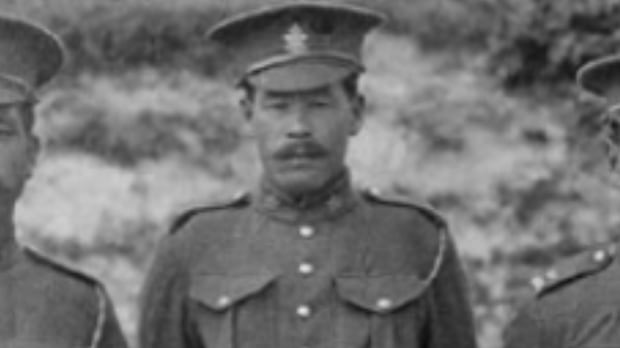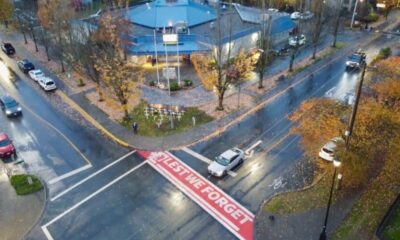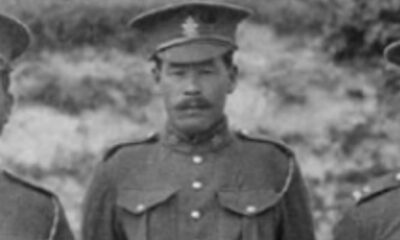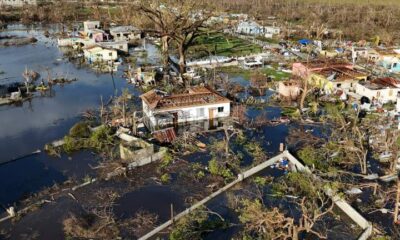Politics
Japanese Canadian Veterans Honored with Public Display in Vancouver

For the first time in over a century, the contributions of Japanese Canadian veterans who served in the First World War are being publicly acknowledged in Vancouver. A community historian, Debbie Jiang, has dedicated more than 15 years to uncovering the stories of these forgotten soldiers, aiming to rectify a historical oversight that has long obscured their heroism.
“These were young men who gave their whole lives and no one remembers them,” Jiang told CBC News. She believes it is a “travesty” that systemic racism has buried their stories, affecting not only public awareness but also the knowledge of their own families.
Uncovering Hidden Histories
During the Second World War, the Canadian government classified all Japanese Canadians, including veterans, as “enemy aliens.” This led to the internment of over 22,000 individuals in British Columbia, as well as the seizure of their property. Kelly Shibata, a descendant of one of these veterans, discovered significant details about his grandfather, Otoji Kamachi, through Jiang’s research. “That is the mystery of all of it — we had virtually no information about his time in the military,” Shibata remarked.
Kamachi was part of a unique group of Japanese Canadian soldiers who enlisted during the First World War, despite being denied the right to vote in 1895. Many of these soldiers were older, in their 30s and 40s, and some had already received military honors. Jiang emphasized that these men fought not just for their country but also to advocate for their community’s right to vote. “They had wives and children, and yet they risked their lives to make a point,” she noted.
Military records reveal that Kamachi served with the 52nd Battalion, taking part in significant battles such as the Vimy Ridge offensive in 1917, the Battle of Hill 70, the Battle of Ypres, and the Battle of Passchendaele. Almost 200 Japanese Canadians served in the First World War, with about a dozen receiving awards for bravery and more than 50 losing their lives.
A Legacy of Resilience
Despite his valor, Kamachi faced further challenges after the war. He was among those forcibly relocated during the Second World War and interned at the Popoff internment camp in Slocan Valley. Following the Japanese attack on Pearl Harbor, both the Canadian and American governments viewed individuals of Japanese descent as security threats. In 1942, Kamachi expressed the hardships caused by internment, stating, “My means of livelihood…was taken by Custodians without my consent.”
Kamachi was able to rebuild his life after the war as a farmer, raising eight children with his wife, Yukie Koreeda. He lived long enough to see Japanese Canadians finally granted the federal right to vote in 1948, though he passed away in 1957, shortly before a formal apology was issued by Prime Minister Brian Mulroney in 1988 for the injustices faced by Japanese Canadians.
Today, Kamachi’s story is part of a larger commemoration in downtown Vancouver, where banners featuring him and 20 other Japanese Canadian veterans from the First and Second World Wars are displayed. Jiang hopes these images will inspire future generations to recognize and remember the sacrifices made by these individuals.
Shibata reflected on the impact of this recognition. “It’s great to be able to honour him in that way and recognize what he did,” he said, noting that learning about his grandfather has brought his family closer together. Jiang echoes this sentiment, expressing a desire for the public to remember these veterans and their contributions. “I want people to be able to look up and say their names,” she said.
-

 World4 months ago
World4 months agoScientists Unearth Ancient Antarctic Ice to Unlock Climate Secrets
-

 Politics4 days ago
Politics4 days agoSecwepemc First Nation Seeks Aboriginal Title Over Kamloops Area
-

 Entertainment4 months ago
Entertainment4 months agoTrump and McCormick to Announce $70 Billion Energy Investments
-

 Lifestyle4 months ago
Lifestyle4 months agoTransLink Launches Food Truck Program to Boost Revenue in Vancouver
-

 Science4 months ago
Science4 months agoFour Astronauts Return to Earth After International Space Station Mission
-

 Technology2 months ago
Technology2 months agoApple Notes Enhances Functionality with Markdown Support in macOS 26
-

 Top Stories4 weeks ago
Top Stories4 weeks agoUrgent Update: Fatal Crash on Highway 99 Claims Life of Pitt Meadows Man
-

 Sports4 months ago
Sports4 months agoSearch Underway for Missing Hunter Amid Hokkaido Bear Emergency
-

 Politics3 months ago
Politics3 months agoUkrainian Tennis Star Elina Svitolina Faces Death Threats Online
-

 Politics4 months ago
Politics4 months agoCarney Engages First Nations Leaders at Development Law Summit
-

 Technology4 months ago
Technology4 months agoFrosthaven Launches Early Access on July 31, 2025
-

 Top Stories2 weeks ago
Top Stories2 weeks agoFamily Remembers Beverley Rowbotham 25 Years After Murder


















